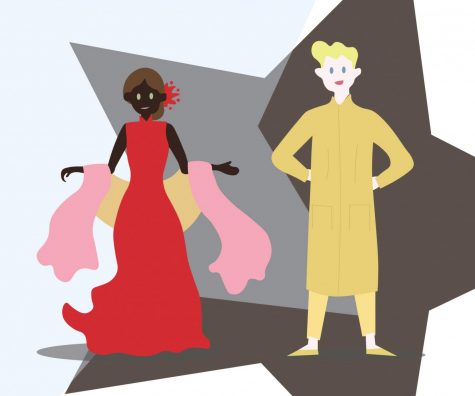Movie review: Swipe left on ‘Love Hard’
Dangers of online dating, men writing female characters made clear

Watch two awful people fall in love with each other based on a foundation of lies and deceit.
November 29, 2021
It is the middle of November, Netflix. So tell me, why are you releasing Christmas movies? Halloween candy is only a few weeks old, and Thanksgiving has just passed. Even if it were time for holiday movies, nobody asked for another horribly predictable Christmas film whose only saving grace is its extremely attractive, well-known actors.
I guarantee if it were not for the leading cast, it most certainly would have slipped through the cracks, never to be seen again.
Now, I do not normally complain this much about Christmas movies. But when it comes to the biggest streaming platform in the world releasing another mediocre, cliche, holiday-themed romantic comedy, I want to scream.
In this latest attempt to make something new from the Christmas theme, Natalie Bauer, played by “The Vampire Diaries” star Nina Dobrev, is a Los Angeles journalist who writes about her horrible online dating experiences. After another slew of back-to-back disastrous dates, her co-worker widens the search radius on the dating app to include the whole country.
Bauer matches with a handsome, outdoorsy man from New York. After many late nights of long conversations over the phone, she decides to travel across the country to surprise him for Christmas, wishfully hoping to finally write a happily-ever-after column.
When Bauer arrives in New York, though, Josh Lin, played by “Silicon Valley” star and stand-up comedian Jimmy O. Yang, does not look like his profile pictures. She finds out that he used pictures of a former friend, Tag, played by “Never Have I Ever” star Darren Barnet, to talk to women on dating apps after being ignored for so long using his own pictures.
Rightfully outraged but stuck in New York due to lost luggage, Bauer stays and pretends to be Lin’s girlfriend to impress his family. In exchange, Lin helps her win over Tag.
The director Hernán Jiménez tries to soften Lin’s betrayal by rationalizing that his lack of self-confidence and his bully-of-an-older-brother led him to the disgusting behavior, but it just left a sour taste in my mouth.
Why not write a few lines where he takes responsibility for his actions and not have him hide behind half-baked excuses? It would have made him a more appealing and less pathetic character to the audience.
However, to the movie’s benefit, Jiménez touches upon a very relevant issue regarding Asian discrimination through Lin’s character. In the movie, Lin believes that he did not receive many dating matches when using his real photos because of his race, which is a valid belief.
Although our society’s views on Asian men have thankfully begun to change due to greater exposure to diverse media, Lin’s belief still rings true. Our society continues to view Asian men as less desirable than other races, even when they most certainly are not.
Nevertheless, not only does Lin catfish Bauer, but Jiménez decides to also have Lin bring her down to his level by deceiving Tag. Throughout the movie, the audience watches as Bauer fundamentally changes everything about herself to become Tag’s “ideal” girl.
On Lin’s recommendations, Bauer pretends to love a misogynistic author, enjoy rock-climbing despite her fear of heights and take pleasure in eating meat, even as a vegetarian.
Although Lin’s duplicity paints him as a horrible character, Jiménez does an even worse job of portraying Bauer’s character in a good light. He tries to paint Bauer as a strong, independent feminist, but it completely falls flat.
Instead, he shows Bauer rarely demonstrating initiative, constantly allowing herself to be subjected to mansplaining and never learning lessons on her own.
Furthermore, Jiménez repeatedly portrays Bauer as a damsel in distress and always needing a man to come to her rescue, whether it is someone taking her to the closest doctor after an allergic reaction or calming her fear of heights during rock-climbing.
Tell me, Jiménez, how do these characteristics depict a strong, independent feminist? If you think a woman who dislikes misogynistic authors or a particular Christmas song warrants that title, you are sadly mistaken. It takes much more than that.
All in all, “Love Hard” is a forgettable film and most certainly does not warrant repeat viewings.
The only reason that I would recommend this movie is to see the dangers of online dating, such as catfishing, and to support the actors who tried to bring life into their pitiful characters.














